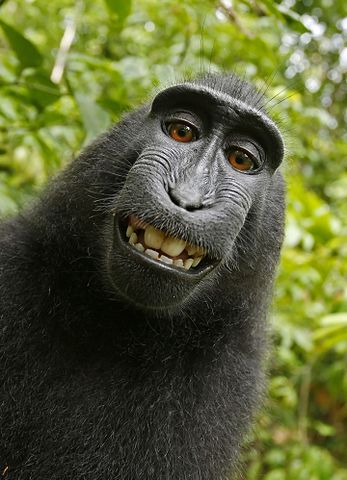Monkey has no standing to assert copyright infringement in selfie case, 9th Circuit rules

Self-portrait by the depicted Macaca nigra. Wikimedia Commons.
A federal appeals court has ruled that a monkey has no standing under the U.S. Copyright Act to assert copyright in selfie photos.
The San Francisco-based 9th U.S. Circuit Court of Appeals ruled Monday in the case of a crested macaque named Naruto and photographer David Slater, who published the photos in a wildlife book. Naruto had snapped the selfies in 2011 after Slater left the camera unattended on a reserve in Indonesia. The Hollywood Reporter, the Recorder and the Associated Press have stories.
Slater had settled the suit by People for the Ethical Treatment of Animals last September when he agreed to donate 25 percent of future gross revenue from the photo to charities dedicated to protecting monkey welfare and habitat in Indonesia. The 9th Circuit said it would hear the case despite the settlement.
Judge Carlos Bea wrote the majority opinion. “We conclude that this monkey—and all animals, since they are not human—lacks statutory standing under the Copyright Act,” Bea wrote.
In a partial concurrence, Judge N. Randy Smith said the courts had no jurisdiction to hear the case.
Both judges were critical of PETA and its decision to settle the case after oral arguments suggested it would lose the appeal. The group had represented Naruto as a “next friend” after a primatologist who initially took on that role decided to drop out of the case. The primatologist had studied Naruto since his birth.
Bea said PETA had not established a significant relationship with Naruto and “we gravely doubt that PETA can validly assert ‘next friend’ status.” In any event, the law does not permit animals to be represented by a next friend, he said. The majority nonetheless said the court had jurisdiction to decide the case.
PETA’s “deficiencies” as next friend go beyond its failure to plead a significant relationship, Bea said. “After seeing the proverbial writing on the wall at oral argument,” Bea said, PETA sought to drop the appeal and vacate an adverse lower court judgment, while maintaining Naruto was not a party to the settlement.
“Puzzlingly, while representing to the world that ‘animals are not ours to eat, wear, experiment on, use for entertainment, or abuse in any other way,’ ” Bea wrote, “PETA seems to employ Naruto as an unwitting pawn in its ideological goals.”
Smith asserted that “PETA brought a frivolous lawsuit here.”
Smith also asserted that PETA’s real motivation in the case was to advance its own interests. “When it came down to a possible negative, precedential ruling from the panel, PETA quickly sought to protect the institution, not the claimed real party in interest,” Smith said.
Write a letter to the editor, share a story tip or update, or report an error.


